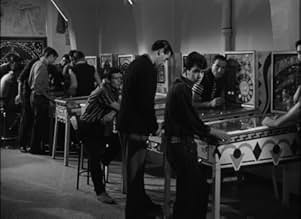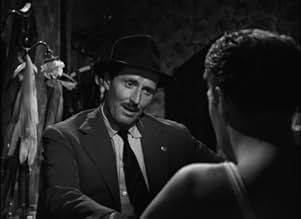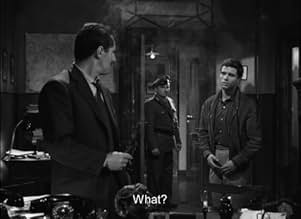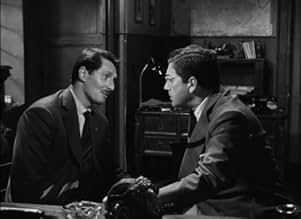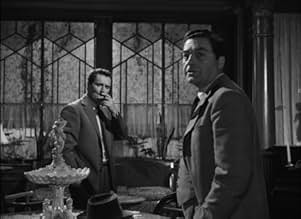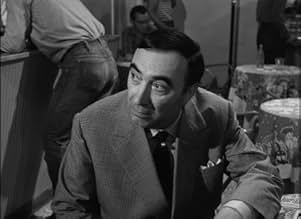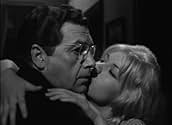CALIFICACIÓN DE IMDb
7.4/10
1.7 k
TU CALIFICACIÓN
Un inspector de policía y su equipo intentan resolver dos delitos cometidos con un día de diferencia en pisos vecinos.Un inspector de policía y su equipo intentan resolver dos delitos cometidos con un día de diferencia en pisos vecinos.Un inspector de policía y su equipo intentan resolver dos delitos cometidos con un día de diferencia en pisos vecinos.
- Dirección
- Guionistas
- Elenco
- Premios
- 5 premios ganados y 3 nominaciones en total
Cristina Gaioni
- Virginia Caraci
- (as Cristina Gajoni)
Ildebrando Santafe
- Anzaloni
- (as Ildebrando Santafé)
Silla Bettini
- Il brigadiere Oreste
- (as Silla)
Opiniones destacadas
This is a good crime/thriller movie. Anyone who likes similar movies, with police investigations/whodunnit as a plot, will like this as well. It's not a masterpiece and the conclusion feels a bit rushed and not too clever, but it's enjoyable overall, without plot holes and somewhat unpredictable. I didn't guess who the culprit is, so this movie is successful in my books. Don't expect mindblowing twists/action/car chases etc. Biggest quality here is the verisimilitude and the acting. Germi is excellent, his character is magnetic and charismatic, i 'd say even that his character is ahead of his time. Of course it's a bit outdated but this is totally norma for a 1959 movie. This is a 2 hours/B&W 1958 movie and it never got boring. Every fan of this genre will enjoy it.
Un maledetto imbroglio (1959) is a very good movie, it tells us about a country -Italy- still far from the wealth of the sixties, where low class people struggled to make a decent living, and illiteracy was still spread ... Higher class people could threaten poor peoples lives for trivial reasons and meantime humiliate them with their unjustified wealth ... Of course the Germi's task was simplified by the great book it started with, still the Director has his merits: the irony to start with. I basically agree with other opinions. if a catch can be found, I'd say acting is a little bit much too heavy. A kind of "Venus's strabismus"... Some of the actors (Eleonora Rossi Drago, Nino Castelnuovo and at times also Germi himself)overdo - overindulge in - their roles ... They fall into unnecessary theatrical poses. to my opinion the drama is in the facts being narrated and need not much emphasizing by the actors.
very good by all means, but just a bit overacted, to my modest opinion.
pion
very good by all means, but just a bit overacted, to my modest opinion.
pion
10dimricc
This is really a overlooked masterpiece! Germi made a terrific movie from the difficult Gadda's novel. One of his greatest films, together with "Divorzio all'Italiana" e "Il Ferroviere". The acting, especially Germi's, is perfect, and the rythm he impressed to the movie is unique, a sad ballad with soft humor touches. This movie make me proud to be italian and make me a little less ashamed of the contemporary italian cinema. Take a look at this gem and you'll understand!!
Although Pietro Germi has the distinction of having directed the prototype of the genre known as Commedia all'Italiana, his non-comedic films are strongly influenced by the cinema of North America and here he has given us a first-rate 'police procedural'.
He and his excellent collaborators Alfredo Giannetti and Ennio de Concini have also faced the daunting task of adapting Carlo Emilio Gadda's 'That awful mess on Via Merulina' which is a panorama of life in Fascist Italy of the late 1920's. Granted, it involves a murder investigation but the author has not felt the need to tell us whodunnit!
The investigating detective in this loose, updated adaptation is played by Signor Germi who has once again opted to direct himself and has created a fascinating character. His skill with actors is legendary and he draws fine performances from Eleonora Rossi Drago, Franco Fabrizi, Claudio Gora, Claudia Cardinale, Nino Castelnuovo and of course the ubiquitous Saro Urzi. Signorina Cardinale is again 'dubbed' as her voice was considered too coarse for the roles she played. She is on the brink here of her greatest decade and we hear her own voice for the first time in Visconti's 'Il Gattopardo' in 1963.
The plot of this is convoluted to say the least but we are carried along by Germi's taut direction, sharp editing by Roberto Cinquini and well-drawn characterisations. Germi's regular cinematographer Leonarda Barboni and composer Carlo Rustichelli contribute immeasurably. Rustichelli's score is particularly full-blooded and he has composed a beautiful and haunting canzona sung by his daughter Alida, entitled 'Otherwise I'll die' which reflects the passionate relationship between the characters played by Cardinale and Castelnuovo. Viewers will no doubt recognise in Cardinale's frantic run after the police car a distinct echo of Anna Magnani's iconic dash in 'Rome, open City'.
Opinions differ as to whether Germi should be counted among the great Italian directors. I suppose it depends upon one's criteria. His most popular films of course have been his beautifully observed satirical comedies but from his directorial debut with the melodrama 'Il Testimone' he has never ceased to show a capacity to tell a story, engage our emotions and to get the very best from his actors. He is sorely in need of reappraisal.
He and his excellent collaborators Alfredo Giannetti and Ennio de Concini have also faced the daunting task of adapting Carlo Emilio Gadda's 'That awful mess on Via Merulina' which is a panorama of life in Fascist Italy of the late 1920's. Granted, it involves a murder investigation but the author has not felt the need to tell us whodunnit!
The investigating detective in this loose, updated adaptation is played by Signor Germi who has once again opted to direct himself and has created a fascinating character. His skill with actors is legendary and he draws fine performances from Eleonora Rossi Drago, Franco Fabrizi, Claudio Gora, Claudia Cardinale, Nino Castelnuovo and of course the ubiquitous Saro Urzi. Signorina Cardinale is again 'dubbed' as her voice was considered too coarse for the roles she played. She is on the brink here of her greatest decade and we hear her own voice for the first time in Visconti's 'Il Gattopardo' in 1963.
The plot of this is convoluted to say the least but we are carried along by Germi's taut direction, sharp editing by Roberto Cinquini and well-drawn characterisations. Germi's regular cinematographer Leonarda Barboni and composer Carlo Rustichelli contribute immeasurably. Rustichelli's score is particularly full-blooded and he has composed a beautiful and haunting canzona sung by his daughter Alida, entitled 'Otherwise I'll die' which reflects the passionate relationship between the characters played by Cardinale and Castelnuovo. Viewers will no doubt recognise in Cardinale's frantic run after the police car a distinct echo of Anna Magnani's iconic dash in 'Rome, open City'.
Opinions differ as to whether Germi should be counted among the great Italian directors. I suppose it depends upon one's criteria. His most popular films of course have been his beautifully observed satirical comedies but from his directorial debut with the melodrama 'Il Testimone' he has never ceased to show a capacity to tell a story, engage our emotions and to get the very best from his actors. He is sorely in need of reappraisal.
I've always felt that the post-war period of Italian and Japanese films contains the highest concentration of quality films, and I continue to discover new gems. Having finally recently seen Germi's 'Seduced and Abandoned', I've begun digging deeper into his filmography, and was not disappointed with 'Un Maledetto Imbroglio' ('The Facts of Murder').
At its heart 'The Facts of Murder' is a pretty straightforward police procedural, albeit a fairly complex and convoluted one for 1959. A break-in investigation soon becomes much more complicated and Inspector Ciccio Ingravallo, played perfectly by Germi himself, must dig through a series of shady, duplicitous characters to uncover the truth.
While it may not have the suspense or surprises of a Hitchcock or a giallo, what this film has is pure watchability, thanks to the attention to detail of a master director at the top of his game.
The casting is superb, with a slew of credible characters, including the great Saro Urzì as the cheeky Marshal Saro and Claudio Gora as the slimy, sweaty Remo Banducci. The acting is superb, particularly Germi, who is easily one of the best actors I've seen, just super-interesting and an absolute joy to watch. The camera work effortlessly carries us through the story, never bringing attention to itself. The script is utterly believable, real-life quirky dialogue peppered with lovely comic moments.
I mean, the level of craft in this film is astounding, and even though it wasn't the most original plot, I just loved every moment of this film. I'll be watching it again at some point, just to catch some of the brilliant quips and perfectly acted moments.
At its heart 'The Facts of Murder' is a pretty straightforward police procedural, albeit a fairly complex and convoluted one for 1959. A break-in investigation soon becomes much more complicated and Inspector Ciccio Ingravallo, played perfectly by Germi himself, must dig through a series of shady, duplicitous characters to uncover the truth.
While it may not have the suspense or surprises of a Hitchcock or a giallo, what this film has is pure watchability, thanks to the attention to detail of a master director at the top of his game.
The casting is superb, with a slew of credible characters, including the great Saro Urzì as the cheeky Marshal Saro and Claudio Gora as the slimy, sweaty Remo Banducci. The acting is superb, particularly Germi, who is easily one of the best actors I've seen, just super-interesting and an absolute joy to watch. The camera work effortlessly carries us through the story, never bringing attention to itself. The script is utterly believable, real-life quirky dialogue peppered with lovely comic moments.
I mean, the level of craft in this film is astounding, and even though it wasn't the most original plot, I just loved every moment of this film. I'll be watching it again at some point, just to catch some of the brilliant quips and perfectly acted moments.
¿Sabías que…?
- TriviaThe murder takes place at 44 Piazza Farnese in Rome, Italy.
- ErroresThe cameraman is clearly visible on the left of the frame in the actual murder scene.
- Versiones alternativasA restored version has been released in 1999, edited by Vincenzo Verzini.
- ConexionesFeatured in Cinema forever - Capolavori salvati (2001)
Selecciones populares
Inicia sesión para calificar y agrega a la lista de videos para obtener recomendaciones personalizadas
- How long is The Facts of Murder?Con tecnología de Alexa
Detalles
- Tiempo de ejecución1 hora 55 minutos
- Color
- Relación de aspecto
- 1.37 : 1
Contribuir a esta página
Sugiere una edición o agrega el contenido que falta

Principales brechas de datos
By what name was Un maldito enredo (1959) officially released in India in English?
Responda
